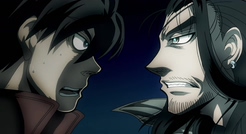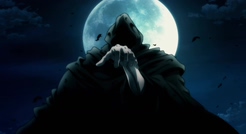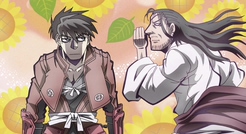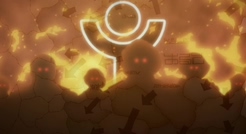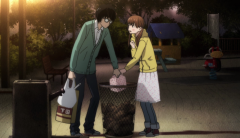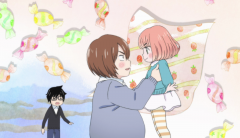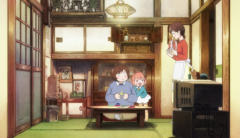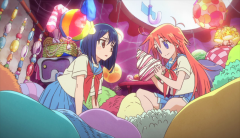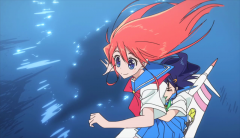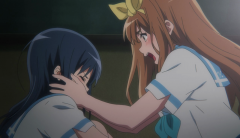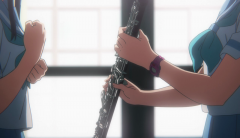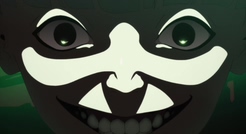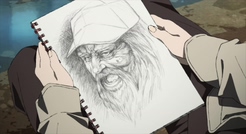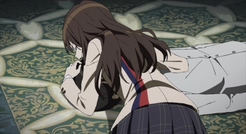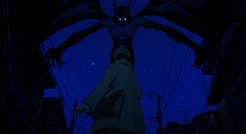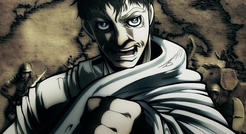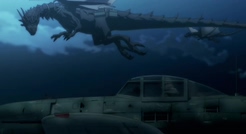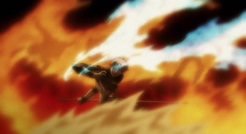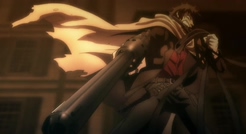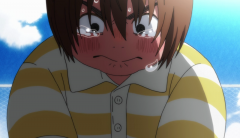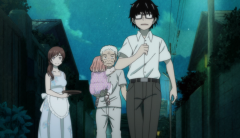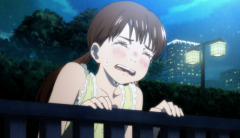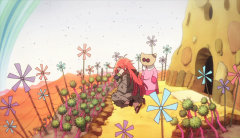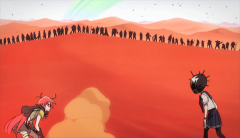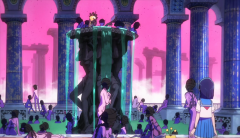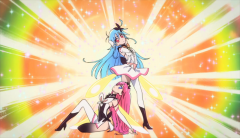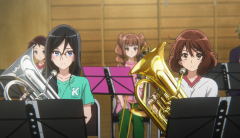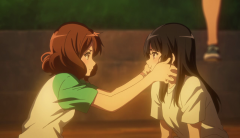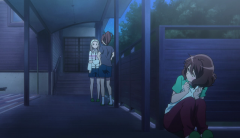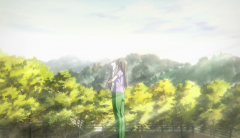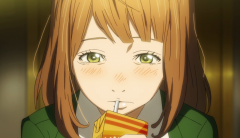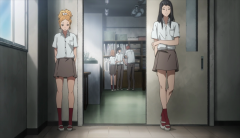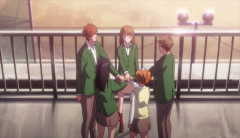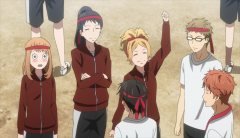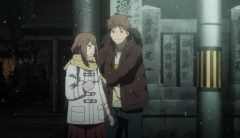Flip Flappers again raises the bar of what is expected of them, as this week the show goes even much trippier than the previous two weeks, and much darker too. They break out even their own formula, starting this episode right in the middle of desert wasteland. While this episode certainly reminds you a lot of other shows (to namelist: Mad Max, Fist of the North Stars, a bit of Star Wars, the fights of FLCL, the transformation of Sailor Moons (with fairy wings), the Super Saiyan powered-up, and whole other real life, historical references that I will discuss later), it still maintains its own personalities, runs its own beats, being busy with its own aesthetic and as a result Flip Flappers just gets weirder and more awesome. This is hand down its best episode so far.
In this episode, Flip Flappers decides to go to new direction. Instead of half-Cocona in her daily school, half-Pure Illusion worlds, they jump straight into the middle of Pure Illusions world. I love how things just got escalated very quickly in this episode in terms of plot, and because we have no idea about that world, the show freely twists our expectations of what about to come. We first follow Papika as she was abducted by the rare race with pumpkin-like faces. We see them as a potential threat for Papika until we see how they live an old but civilized, peaceful lives. Then, Mad Max-style gang of bandits attack the village and take their water. Their biggest, bad-assed guy challenged Papika and it all turned out that they’re no match for her. Then revealed their boss who is none other than Cocona, in mask. Then when that fight between two girls are done, we learned that Cocona has been manipulated by the girl in black. Then they nearly lose their lives to beat that monster, just so the other group comes in and kills it in 3 seconds. And the three people in that other group are just some pawns for something much bigger. You get what I mean? Flip Flappers keeps … well… flipping our expectations around that except from knowing Cocona and Papika will be alright, we can’t never tell for sure what going to happen. Everyone is not what they seem (clued in Cocona’s obaa-chan here, her detached response gives me a chill, I wouldn’t be surprised if she turns out to be some sorts of villain), and everything is not what it seems; they are the only rules of Flip Flappers.
Apart from its aesthetic which is already mesmerizing and overwhelming, the amount of symbolisms here in Flap Flappers is just way toooo much. But that’s why I love it. As one of our reader pointed out before, Uexekull is a reference to Jakob von Uexküll, a biologist who actually influenced some areas of philosophy like Phenomenology (study of the structures of experience and consciousness), which is kind of related to Pure Illusion experience. The chanting of Asclepius from the other organization is come from the god of healing Asclepius in Greek mythology, which also appropriate since Cocona was in that place that resembling strongly to the ruined Greek buildings, but I’m still not sure why they use that reference though. The antagonist girl, who I don’t know where the show inspires of, clearly symbolizes something lustful, decay and manipulation. The robot TT392 proves again to be the most human character that we’re all can related to well, as he spiraled out of control when seeing naked girls and basically was volunteered to be the sexiest girl’s servant at all cost. At least I know that what I would do too. And there is one thing you should learn for the next Pure Illusion trip Cocona and Papika: make the hole on the ground, that’d save you a lot of trouble.
I have mentioned last week that I think Cocona and Papika both the represent the dual side of girlhood. Well, I still stand by that because the theme of duality is still going strong here. Cocona was manipulated to fight against Papika because she’s unsure about her shelf, she wants to break out from that shelf (the feeling of wanting to punch Papika). Moreover, sexuality theme again popped up here, last week it was to control your desire, this week lust is hindered everywhere, from that infamous dark scene, to the fact that the fragment is located in Cocona’s thigh; and isn’t it the girl’s transformations represent their ultimate purity? Also, their hair change to other’s counterpart colors after transformation, and their transformation names Pure Blade/ Pure Barrier support that duality theme as well, as do you see any fighter without either blade or shield? Also, it is interesting to note that the FlipFlap organization is designed as some kind of broken down lab sciences, while with the other organization, it looks like a cultish group. Kinda huge leap from the groups that share the same objectives don’t you think?
Here’s one of my theory about the nature of Pure Illusions. It might represent the state of mind, the characteristics of one particular characters. In the first episode it’s Cocona’s version, as a result we have a winter snowy landscape (because she’s coldhearted), no people around (because she’s lonely). In the second episode it’s Uexkull’s, so the girls transform into bunnies, the colors are overloaded (indicates that it isn’t human visions). If we follow that sense then this episode is from the characteristic of Papika, which kind of make sense because of her hotheaded nature (desert), her outgoing traits (this is the first Pure Illusion world that we have other people, other races, and more spectacularly they are not one but 3 races), and the red desert that align with her hair colors is a dead giveaway. But I agree that this is kind of stretching the idea and somehow if they have indeed done it that way then I feel they are limited to themselves. The fun here in Flip Flappers is to sit back and enjoy the imaginary washes over you, and you just keep your eyes peeled and follow their sense of madness logic because you know it gonna be a fun ride. I have fastened my seatbelt, now take me to wherever you want to go, Flip Flappers!!!

